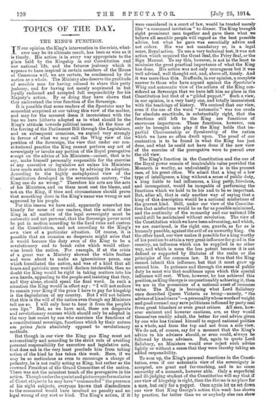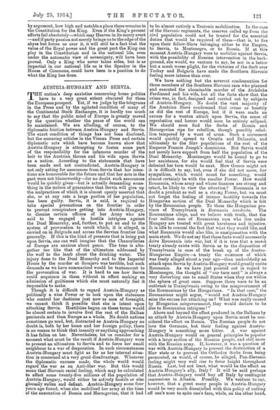TOPICS OF THE DAY.
THE KING'S FUNCTION.
TN our opinion the King's intervention in the crisis, what- ever may be its ultimate result, has been as wise as it is timely. His action is in every way appropriate to the place held by the Kingship in our Constitution and our national life, and the fatuous jealousy which it appears to have inspired in certain members of the House of Commons will, we are certain, be condemned by the nation as a whole. The Ministry also deserve the gratitude of sensible men for having refused to share this petty jealousy, and for having not merely acquiesced in but loyally endorsed and accepted full responsibility for his Majesty's action. By so doing they have shown that they understand the true function of the Sovereign. It is possible that some readers of the Spectator may be somewhat surprised at our taking this view of the matter, and may for the moment deem it inconsistent with the line we have hitherto adopted as to what should be the King's attitude towards political issues. At the time of the forcing of the Parliament Bill through the Legislature, and on subsequent occasions, we argued very strongly in favour of what we may call the Whig view of the position of the Sovereign, the view that under our con- stitutional practice the King cannot perform any act of sovereignty or invoke any portion of the Royal prerogative (swept on the advice of his Ministers—cannot, that is to say, make himself personally responsible for the exercise of any executive or legislative act unless his Ministers have made such action their own by advising its adoption. According to the highly metaphysical view of the Constitution developed in the seventeenth century, "the King can do no wrong." Therefore his acts are the acts of his Ministers, and on them must rest the blame, and not on the King, if time and circumstance should prove that something done in the King's name was wrong or not approved by his people.
For this reason we have said, apparently somewhat too bluntly for some of our readers, that the action of the King in all matters of the legal sovereignty must be automatic and not personal, that the Sovereign power must be put in motion according to the fixed rules and custom of the Constitution, and not according to the King's own view of a particular situation. Of course, it is possible that an occasion so desperate might arise that it would become the duty even of the King to be a revolutionary and to break rules which would other- wise break the nation. For example, if at the crisis of a great war a Ministry showed the white feather and were about to make an ignominious peace, one which humiliated the nation, and was of a kind that all brave and patriotic men would declare intolerable, then no doubt the King would be right in taking matters into his own hands, appealing to the people and insisting that they, and they alone, should speak the final word. In such a situation the King would in effect say : "I will not endure to remain your King if the price I have to pay for kingship is the degradation of my country. But I will not believe that this is the will of the nation even though my Ministers tell me so. I will only bear to hear it from the people's own lips." But, as we have said, these are desperate and revolutionary courses which should only be adopted in the very last resort by one who exercises the functions of a constitutional sovereign, functions which by their nature are prima facie absolutely opposed to revolutionary methods.
But though in our view the King pa King must act automatically and according to the strict rule of avoiding personal responsibility for executive and legislative acts, that does not in the very least preclude him from taking action of the kind he has taken this week. Here, if we may be so meticulous as even to encourage a charge of pedantry, he is not really acting as King, but rather as the crowned President of the Grand Committee of the nation. There was not the minutest touch of the prerogative in his action. Though under the quaint and picturesque formularies of Court etiquette he may have " commanded " the presence
of his eight subjects, everyone knows that disobedience
to the command would have involved no penalty and no legal wrong of any sort or kind. The King's action, if it were considered in a court of law, would be treated merely like "a command invitation" to dinner. The King brought eight prominent men together and gave them what we believe all sensible people will regard as the best possible advice, but what he gave was essentially advice and not orders. His was not mandatory or, in a legal sense, Royal action. To use a very technical test, it was not action which required the Great Seal, the Privy Sea], or the Sign Manual. To say this, however, is not in the least to minimize the great practical importance of what the King has done. His action was not only courageous but it was well advised, well thought out, and, above all, timely. And it was more than this. It affords, in our opinion, a complete answer to those who have argued against the spectator's Whig and automatic view of the actions of the King con- sidered as Sovereign that we have left him no place in the Constitution but that of a "gilded puppet." Such a view, in our opinion, is a very hasty one, and totally inconsistent with the teachings of history. We contend that our view, even if the use of the word " automatic " was too crude for absolute exactitude, is substantially right, that the functions still left to the King are functions of enormous importance. These functions, however, can only be brought into play if the King holds that im- partial Chairmanship or Speakership of the nation which we have so often dwelt upon. The proof of our contention is to be found in what the King has just done, and what he could not have done if the new view of the exercise of the prerogative were to prevail over the old view.
The King's function in the Constitution and the use of the Royal power remain of incalculable value provided the Monarch is worthy, as undoubtedly he is in the present case, of his great office. We admit that a king of a low type of intelligence, a king without a sense of public duty, a king liable to bad influences, a king petty, frivolous, and incompetent, would be incapable of performing the functions which we hold to be his and to be so important. But, after all, that is only another way of saying that a king of this description would be a national misfortune of the gravest kind. Still, under our view of the Constitu- tion that misfortune would be as far as possible minimized, and the continuity of the monarchy and our national life could still be maintained without revolution. The view of the Constitution which we have been advocating, and which, we are convinced, is the right one, guards, as far as is humanly possible, against the evil of an unworthy king. On the other hand, our view makes it possible for a king worthy of his position to attain a very great influence for gcod in the country, an influence which can be supplied in no other way, and which is none the less potent because it is not defined or supported by Statutes of the realm or the principles of the common law. It is true that the King cannot inherit this influence, but that it must grow up around him. In patience and through the sense of public duty he must win that confidence upon which this special influence will rest. When, however, he has achieved this position, asKing George is unquestionably achieving it, then we are in the possession of a national asset of immense value. The King is becoming what Lord. Salisbury once described Queen Victoria as being—namely, "the adviser of his advisers "—a personality whose words of weight and good counsel may save politicians inflamed by party zeal from great blunders or even great crimes. All men, how- ever eminent and however cautious, are, as they would themselves readily admit, the better for cool advice given by one who has trained himself to regard national politics as a whole, and from the top and not from a side view. We do not, of course, say for a moment that the King's advice to his advisers should, or even could, always be followed. by those advisers. But, again to quote Lord Salisbury, no Ministers would ever reject such advice lightly or without a sense that they were thereby taking an added responsibility.
To sum up, the King's personal functions in the Consti- tution, even if our automatic view of the sovereignty is accepted, are great and far-reaching, and. in no sense unworthy of a monarch, however able. Only a superficial and ill-judging student of the Constitution will say that if our view of kingship is right, then the throne is no place for a man, but only for a puppet. Once again let us set down our view that King George's action this week has shown by practice, far better than we or anybody else can show by argument, how high and notable a place there remains in the Constitution for the King. Even if the King's present efforts fail absolutely—which may Heaven in its mercy avert —and if party passion not merely brings us to the edge of the abyss but forces us over it, it will still be a fact that the value of the Royal power and the great part the King can play in the Constitution and in the national life, even under the automatic view of sovereignty, will have been proved. Only a King who never takes sides, but is as impartial in our national life as is the Speaker in the House of Commons, could have been in a position to do what the King has done.







































 Previous page
Previous page